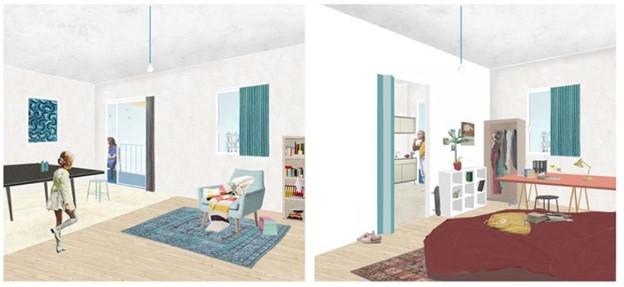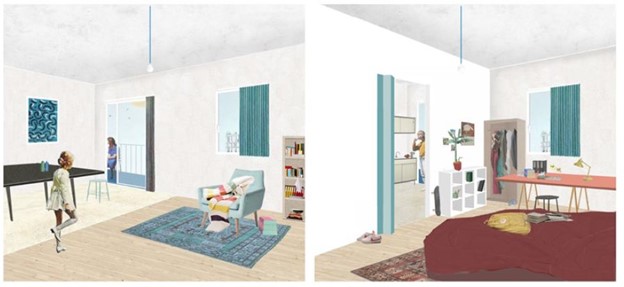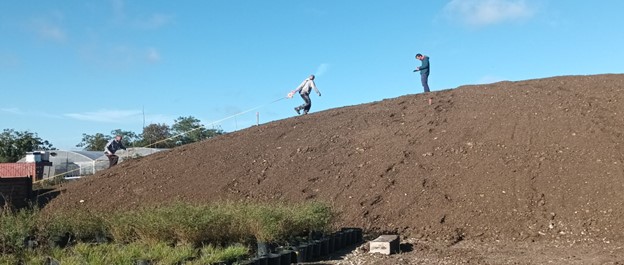
As colossal international events, Olympic Games require major public investments to update infrastructure, accommodate athletes and host millions of spectators from all over the world. The 2024 Paris Olympic Games show they can also be an occasion to rethink how public purchases can generate long-term benefits for the community and environment.
The Paris Games made special efforts to ensure its organisers procured goods and services from social enterprises and promoted reusing existing goods and materials over new ones. This was made possible thanks to a conscious effort of public procurers (SOLIDEO), social economy enterprises (Halage), and intermediary actors (like Les Canaux via the ESS2024 platform) to create solid bridges across expertise fields to promote inclusive job opportunities and minimise the Olympics’ carbon footprint.
The largest network of reuse, repair, and recycling social enterprises RREUSE featured these organisations’ inspiring work in its new public procurement research report. In this joint article, we go through the key features of this collaboration and how this encouraging case study can inspire more sustainable and inclusive public procurement in France and the rest of the EU.
PUBLIC PROCUREMENT AS A CATALYST FOR A MORE SOCIAL AND CIRCULAR ECONOMY
Central to promoting social inclusion in the upcoming Olympic Games is the Paris 2024 Social Charter.[1] The Charter strongly emphasises social considerations in public procurement, for instance, by involving social economy enterprises in public contracts and committing to decent and inclusive jobs for individuals far from labour market opportunities.
To implement the Social Charter, the public body SOLIDEO adopted clear and enforceable targets to ensure inclusive employment opportunities in the Olympics preparation. They include a minimum 25% target (€536 million) of the contracts’ total amount reserved for small and medium enterprises (SMEs) and social economy actors. In addition, at least 10% of the required working hours must be granted to individuals excluded from labour market opportunities (around 2.5 million).
A key component of reducing negative environmental impacts for the Paris Olympics was prioritising renovating existing buildings and reusing furniture via circular public procurement. The added value to promoting reuse is self-evident, as it entails using existing products rather than sorting to produce new ones, thus preventing landfilling and saving resources.[2]
Another strategic choice was to leverage circular public procurement to integrate modularity in the building design. For instance, the Athletes' Village covers over 330,000 square meters and provides over 2,200 accommodation units for around 10,500 athletes. However, the Olympic Games will only last for about two months. SOLIDEO thus requested buildings to be designed for future repurposing so they can be turned into a mixed neighbourhood including family housing, offices and public facilities after the games.

Source: Document Projet de Village Olympique
BRIDGING THE GAP BETWEEN SOCIAL ECONOMY AND PUBLIC BUYERS
How can public buyers ensure the social economy contributes to events like the Olympics? The Paris experience demonstrates that the intermediation efforts to bring public buyers and social enterprises together via a dedicated platform were crucial to involve social enterprises in public procurement and stimulate socio-ecological innovations.
The ESS2024 platform is a partnership between the Paris 2024 Olympics, SOLIDEO, Les Canaux and the Yunus Centre. It provides services such as information sharing, advice and training to social, small, and circular businesses to help them respond to public procurement tenders.
As such, ESS2024 has actively contributed to achieving sustainable public procurement goals by supporting social economy actors in obtaining public contracts associated with the Paris Olympics. As a result, around 6,000 social enterprises have received support and nearly 500 have been involved in organising the Paris Games.
If we had a specific need, we would reach out to ESS2024 and they would use their huge database of local social enterprises to tell us what organisations could meet our needs. They also helped us prepare and write tenders in a way that facilitated access to social enterprises. - Julie Fournier, Circular, Social and Solidarity Economy Project Manager at SOLIDEO |
SOCIAL ECONOMY IN ACTION
Within the broader effort to prioritise social and circular activities for the Olympics, SOLIDEO published a tender whose main task consisted of producing high-quality soil substrates with materials deriving from deconstruction, green waste, and clean soil. The reconstituted soil was used to build the Village des Athlètes in Saint-Ouen-sur-Seine and Saint-Denis. The contract was won by the consortium led by the social enterprise Halage.
Halage is a social enterprise based in L’Île-Saint-Denis that employs around 120 people, 85 of whom follow a work integration programme. The social enterprise specialises in composting, urban gardening and green space management and played a central role in forming the consortium with the consultancy Neo-Eco and the private company ECT.
| For our integration workers, this was very important. They could feel that they were part of an international event. They felt that they were among the ones making the Paris Olympics possible. That gave them motivation and confidence. - Stéphane Berdoulet, Director at Halage |
Urban development contributes to large quantities of soil extraction and CO2 emissions due to soil transport from rural areas. This has a huge negative impact on natural ecosystems and air quality, among other things. In France, almost 20 million tonnes of soil are transported into cities every year. It is also estimated that a single project like the new Grand Paris Express metro line will generate between 40 and 45 tonnes of excavated soil.

Source: Association Halage
THE BENEFITS FOR THE COLLECTIVE INTEREST
By treating waste as a resource, the consortium led by Halage preserved 1,500 cubic metres of natural soil and avoided hundreds of kilometres of road transport and related CO2 emissions. On top of that, Halage trained unemployed people on skills for preparing soils from recovered materials, such as compost and fertile substrate production and using construction and demolition waste as a resource. Once they completed the training, all individuals secured additional training or job opportunities in the mainstream labour market.
Compared to the baseline scenario, the construction of the Athletes’ Village is estimated to have saved 45% of CO2 emissions. SOLIDEO also surpassed the initial target of a 90% recovery rate by achieving a 94% rate and reusing over 860 tonnes of materials.
In addition, SOLIDEO awarded 36% (€785 million) of the total award amount to SMEs and social economy actors as of May 2024, surpassing the initial minimum target of 25%. It also surpassed the initial target of working hours for individuals finding barriers to accessing the mainstream job market from 2,4 (10%) to over 3 million hours.
NO OBSTACLE TOO GREAT FOR A DETERMINED MIND
The Paris 2024 Olympics and SOLIDEO’s initiatives are a testament to the innovative possibilities of promoting socially responsible and circular public procurement with the involvement of social economy enterprises. By committing to social and circular goals backed by clear and enforceable targets and the set up of ESS2024, the Paris Olympics presents an encouraging example that, where there is political will, public procurement can be a force for good.
You can find more about the Paris 2024 Olympics in the RREUSE public procurement research report. Across France, Ireland, the UK, Spain, Croatia, Finland, and Austria, the RREUSE report showcases concrete experiences from social economy actors and public authorities presenting valuable data on how public procurement can generate social, environmental, and economic impact.
Authors:
- Simone Schirru, Policy Officer at RREUSE
- Julie Fournier, Circular, Social and Solidarity Economy Project Manager at SOLIDEO
- Elisa Yavchitz, Director, Les Canaux
[1] See https://www.paris2024.org/en/a-social-charter-for-responsible-games/
[2] The French law against waste for a circular economy (AGEC) mandates the procurement of at least 20% of furniture from the reuse sector.
Details
- Publication date
- 2 July 2024
- Author
- Directorate-General for Employment, Social Affairs and Inclusion
- EU Country
- France
- Subjects
- Associations
- Buy social
- Circular economy
- Cooperatives
- entrepreneurship
- Event
- Governmental actors
- Green transition
- National level
- Partnerships / Social economy clusters
- Project story
- Regional level
- Skills
- Social economy organisation
- Social Enterprises
- Social inclusion
- Social innovation
- Socially responsible public procurement
- Stakeholder reflections
- Work integration
